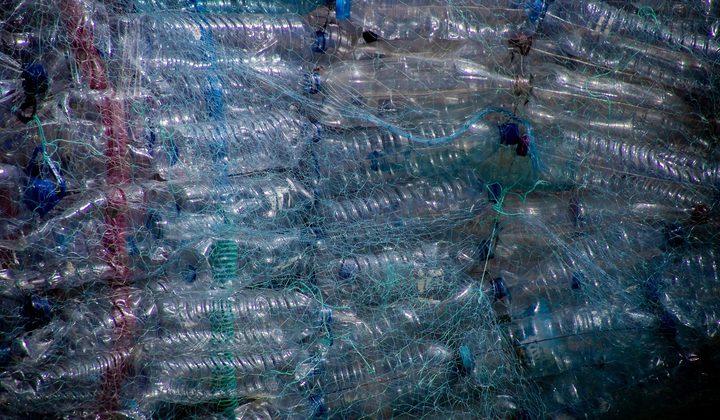The Global Review of Aid for Trade 2024, held at the WTO on 26–28 June, offered opportunities to explore how aid for trade and financing can support trade-related contributions and responses to the sustainable development priorities of developing countries, including in relation to environmental challenges. Members of the WTO Dialogue on Plastics Pollution could consider a number of options as they seek to identify and spur cooperation on the needs of developing and least developed countries in relation to addressing their plastic pollution challenges.
Plastic pollution is a major threat to the environment, human health, and sustainable development. In March 2022, governments adopted a landmark resolution at the United Nations Environment Assembly (UNEA) to launch negotiations on a legally binding international instrument on plastic pollution. The ambition is to conclude the global plastics treaty negotiations by the end of 2024.
Importantly, the resolution addresses the full life cycle of plastics. In 2021, the value of global plastics trade across the life cycle of plastics—from feedstocks and primary forms of plastics through to manufactured products and plastic waste—reached at least $1.2 trillion. This underlines the centrality of trade to the global plastics economy.
Priority Areas for Aid for Trade Identified in the WTO Dialogue on Plastics Pollution
Recognizing the relevance of trade and trade policies to tackling plastic pollution, a growing group of World Trade Organization (WTO) members has joined the Dialogue on Plastics Pollution (DPP). Established in 2020 to explore how trade-related cooperation at the WTO could support global efforts to reduce plastic pollution, the DPP now attracts participation from over 80 WTO members from a broad diversity of regions and levels of economic development, including least developed countries (LDCs), small island developing states (SIDS), and small vulnerable economies (SVEs).
A striking feature of the DPP is the leadership role that a group of developing countries has played in its formation, due in large part to the growing range of negative impacts of plastic pollution on their sustainable development. For developing countries, plastic pollution poses significant threats, including detrimental effects on key economic sectors and fiscal costs for governments faced with financing the prevention and management of plastic pollution.
A striking feature of the DPP is the leadership role that a group of developing countries has played in its formation, due in large part to the growing range of negative impacts of plastic pollution on their sustainable development.
At the Thirteenth WTO Ministerial Conference (MC13) in February 2024, the DPP circulated a ministerial statement that identifies areas for international cooperation on the trade dimensions of plastic pollution. In the statement, participating members agree on the importance of such cooperation to “address trade-related capacity building and technical assistance needs of developing Members, least-developed Members, SVEs and SIDS, including through the implementation of Aid for Trade and facilitate ongoing efforts to better match existing funding opportunities with specific trade-related needs identified by developing Members to tackle plastic pollution.”
In the annex, the ministerial statement includes a compilation of trade-related capacity building and technical assistance needs of developing members, LDCs, SIDS, and SVEs raised in DPP discussions, which identifies a number of priority areas for addressing trade-related aspects of plastic pollution put forward by respondents to the Aid for Trade Global Review and Needs Assessment Survey.
Building on the areas identified thus far, an important next step is to spur outcome-oriented discussions among DPP members. This should include providing guidance for inter-agency deliberations that could be convened involving the WTO Secretariat and other relevant international organizations involved in providing support to developing countries on trade, environment, and development matters, along with recipient and donor governments, including their agencies involved in aid for trade. Such discussions could prioritize next steps and actions needed to respond to specific needs and gaps through aid for trade and help identify the most effective and efficient means of channeling such support.
For developing countries, LDCs, SIDS, and SVEs, the recent global review underscored that aid for trade is an essential component of the financing and investment landscape necessary for them to harness trade and trade policies for their sustainable development, including in combatting plastic pollution. The importance of cooperation with developing countries on plastic pollution, including through financial support and technical assistance and capacity building, is clearly emphasized in the UNEA resolution.
Aid for trade is an essential component of the financing and investment landscape for developing countries, LDCs, SIDS, and SVEs to harness trade and trade policies for their sustainable development, including in combatting plastic pollution
Specific Considerations for DPP Discussions on Aid for Trade and Financing Going Forward
Research conducted by TESS on trade-related issues relevant to plastic pollution in developing countries has identified some specific considerations that DPP members could bear in mind as they work towards concrete outcomes on aid for trade and financing. These considerations have a strong linkage with the priority areas for aid for trade as identified in the DPP compilation list, including for example:
- Ensuring that discussions on aid for trade efforts to improve the environmentally sound management, recovery, and recycling of plastics are not confined to approaches concerning the downstream segment of the life cycle. They should also consider midstream and upstream approaches, such as cooperation on product design requirements and standards to improve material efficiency, durability, repairability and reusability of products, and reducing unnecessary or excessive plastic packaging in traded goods, which can lessen the overall burden of plastics on waste management systems.
- Focusing attention on trade-related support for access to technologies relevant to minimizing, preventing, and addressing post-consumer waste and pollution across the life cycle of plastics, with a focus on those sectors that are of vital importance from a trade perspective to developing countries, such as textiles, light manufacturing, and packaging for fruit, vegetables, and fisheries products
- Prioritizing specific trade-related challenges and constraints faced by LDCs, SIDS, and SVEs in plastic waste management action, including in relation to the implementation of the Basel Convention’s plastic waste amendments and to support regional recycling and waste management hubs that are environmentally sound and aligned with the Basel Convention technical guidelines.
- Fostering aid for trade initiatives aimed at addressing expanding trade in environmentally sustainable and effective non-plastic substitutes, including those identified as having lower environmental impacts from a life-cycle perspective (such as algae or agricultural wastes), while also delivering trade and development benefits for developing countries. This could include support the capacities of developing countries for domestic production and exports for environmentally sound and safe non-plastic substitutes that can replace single-use plastics.
- Prioritizing enhanced support for trade-related aspects of requirements and standards to address pollution across the plastics life cycle, including by supporting the use of international standards and greater participation of developing countries and their business sectors in the development of relevant international standards. Aid for trade support could also be channeled through the Standards and Trade Development Facility, a global partnership based at the WTO that supports capacity on implementation of trade-related standards for food safety and animal and plant health in developing countries.
- Identifying as a low-hanging fruit for aid for trade various customs-related needs and priorities relevant to addressing plastic pollution. These could, for example, include training and capacity building initiatives for customs officials to identify problematic plastics that are the focus of national efforts to reduce and eliminate.
In addition to looking at the aid for trade dimension in a cross-cutting manner, DPP members could also consider identifying concrete aid for trade initiatives that could be integrated into actionable outcomes for MC14 emerging from the other two DPP workstreams: (i) Reduction to Tackle Plastic Pollution and (ii) Promoting Trade to Tackle Plastic Pollution. This could also include aid for trade initiatives to address specific trade-related regulatory, institutional, and capacity gaps that DPP members may identify as impeding the implementation of these outcomes.
Finally, the aid for trade dialogue could work to inform and support links with the global plastics treaty negotiations at the Intergovernmental Negotiating Committee (INC). Doing so could strengthen synergies between aid for trade discussions and ongoing negotiations at the INC and ensure that adequate, reliable, and timely resources are mobilized to support the diverse needs of countries, particularly the developing and least developed, to address pollution along various stages of the life cycle of plastics.
After nearly three years of discussion on the importance of aid for trade to address trade-related plastic pollution challenges, concrete outcomes on the topic must be reached.
Reaching Concrete Outcomes
As WTO members work through the DPP to bolster cooperation on trade and trade policies to support global efforts to end plastic pollution, strengthened aid for trade on plastic pollution will be vital. After nearly three years of discussion on the importance of aid for trade to address trade-related plastic pollution challenges, concrete outcomes on the topic must be reached. Beyond aid for trade, a broader package of sustainability-related financing and development assistance will also be necessary to address the plastic pollution crisis in developing countries, LDCs, SIDS, and SVEs.
-----
Mahesh Sugathan is Senior Policy Advisor, Forum on Trade, Environment, & the SDGs (TESS).
-----
Synergies by TESS is a blog dedicated to promoting inclusive policy dialogue at the intersection of trade, environment, and sustainable development, drawing on perspectives from a range of experts from around the globe. The editor is Fabrice Lehmann.
Disclaimer
Any views and opinions expressed on Synergies are those of the author(s) and do not necessarily reflect those of TESS or any of its partner organizations or funders.
License
All of the content on Synergies is licensed under a Creative Commons Attribution-NonCommercial-ShareAlike 4.0 International (CC BY-NC-SA 4.0)
license. This means you are welcome to adapt, copy, and share it on your platforms with attribution to the source and author(s), but not for commercial purposes. You must also share it under the same CC BY-NC-SA 4.0 license.
If you would like to reuse any material published here or if you have any other question related to Synergies, send an email to fabrice.lehmann@graduateinstitute.ch.




